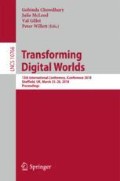Abstract
This study explores the temporal patterns of Twitter use in academia, through quantitative and qualitative methods, answering the following questions: When do academics tweet? Where do academics tweet? and How often do academics receive feedback from their followers on Twitter? UK academics who are active users of Twitter in a specific institution were recruited for the study. Both the temporal patterns (daily and weekly) in the use of Twitter and the uses themselves suggest that the practice is seen primarily as a professional matter, and secondarily as personal. A significant pattern of ‘microbreaks’ is identified. The data indicates that where Twitter use becomes habitual, it is experienced as a positive addition to available communication tools.
Access this chapter
Tax calculation will be finalised at checkout
Purchases are for personal use only
References
Aharony, N.: Web 2.0 use by librarians. Libr. Inf. Sci. Res. 31(1), 29–37 (2009). https://doi.org/10.1016/j.lisr.2008.06.004
Carpenter, J.P., Krutka, D.G.: How and why educators use Twitter: a survey of the field. J. Res. Technol. Educ. 46(4), 414–434 (2014)
Carpenter, J.P., Krutka, D.G.: Engagement through microblogging: educator professional development via Twitter. Prof. Dev. Educ. 41(4), 707–728 (2015). https://doi.org/10.1080/19415257.2014.939294
Dunn, J.: 100 ways to use Twitter in education, by degree of difficulty (2012). http://edudemic.com/2012/04/100-ways-to-use-twitter-in-education-by-degree-of-difficulty/
Ebner, M., Lienhardt, C., Rohs, M., Meyer, I.: Microblogs in higher education - a chance to facilitate informal and process-oriented learning? Comput. Educ. 55(1), 92–100 (2010). https://doi.org/10.1016/j.compedu.2009.12.006/
Grosseck, G.: To use or not to use web 2.0 in higher education? Procedia - Soc. Behav. Sci. 1(1), 478–482 (2009). https://doi.org/10.1016/j.sbspro.2009.01.087
Harvey, A.S.: Guidelines for time use data collection and analysis. In: Pentland, W.E., Harvey, A.S., Lawton, M.P., McColl, M.A. (eds.) Time Use Research in the Social Sciences, pp. 19–45. Kluwer Academic/Plenum Publishers, New York (1999)
Holotescu, C., Grosseck, G.: Using microblogging in education. Case study: Cirip. ro. Procedia - Soc. Behav. Sci. 1(1), 495–501 (2008). https://doi.org/10.1016/j.sbspro.2009.01.090
Honeycutt, C., Herring, S.C.: Beyond microblogging: conversation and collaboration via Twitter. In: Proceedings of the 42nd Annual Hawaii International Conference on System Sciences, (HICSS), Hawaii, USA (2009). https://doi.org/10.1109/hicss.2009.602
Junco, R., Heiberger, G., Loken, E.: The effect of Twitter on college student engagement and grades. J. Comput. Assist. Learn. 27(2), 119–132 (2011). https://doi.org/10.1111/j.1365-2729.2010.00387.x
Kaplan, A.M., Haenlein, M.: Users of the world, unite! The challenges and opportunities of social media. Bus. Horiz. 53(1), 59–68 (2010). https://doi.org/10.1016/j.bushor.2009.09.003/
Kirkup, G.: Academic blogging: academic practice and academic identity. Lond. Rev. Educ. 8(1), 75–84 (2010). https://doi.org/10.1080/14748460903557803
Lalonde, C.: The Twitter experience: the role of Twitter in the formation and maintenance of personal learning networks. Unpublished MA thesis, Royal Roads University (2011). http://hdl.handle.net/10170/451
Lupton, D.: ‘Feeling better connected’: academics’ use of social media. News & Media Research Center, University of Canberra, Canberra (2014)
Mulatiningsih, B., Partridge, H., Davis, K.: Exploring the role of Twitter in the professional practice of LIS professionals: a pilot study. Aust. Libr. J. 62(3), 204–217 (2013). https://doi.org/10.1080/00049670.2013.806998
Nicholas, D., Rowlands, I.: Social media use in the research workflow. Inf. Serv. Use 31(1–2), 61–83 (2011). https://doi.org/10.3233/ISU-2011-0623
Prensky, M.: Digital natives, digital immigrants. On Horiz. 9(5), 1–6 (2001)
Reinhardt, W., Ebner, M., Beham, G., Costa, C.: How people are using Twitter during conferences. In: Hornung-Prähauser, V., Luckmann, M. (eds.) Creativity and Innovation Competencies on the Web, Proceeding of 5. EduMedia conference, pp. 145–156, Salzburg (2009). http://lamp.tu-graz.ac.at/~i203/ebner/publication/09_edumedia.pdf
Rhode, J.: Using Twitter for teaching, learning, and professional development. Northern Illinois University, Social Media Series (2012). http://www.slideshare.net/jrhode/using-twitter-for-teaching-learning-and-professional-development
Risser, H.S.: Virtual induction: a novice teacher’s use of Twitter to form an informal mentoring network. Teach. Teach. Educ. 35, 25–33 (2013)
Seal, K.C., Przasnyski, Z.H.: Using the World Wide Web for teaching improvement. Comput. Educ. 36(1), 33–40 (2001). https://doi.org/10.1016/s0360-1315(00)00049-x
Selwyn, N.: Social media in higher education. In: Gladman, A. (ed.) The Europa World of Learning, pp. 1–9. Routledge, London (2012)
Shah, N.A.K.: Factors influencing academics’ use of microblogging in higher education. Unpublished doctoral dissertation, University of Sheffield, United Kingdom (2015)
Veletsianos, G.: Open practices and identity: evidence from researchers and educators’ social media participation. Br. J. Educ. Technol. 44(4), 639–651 (2013). https://doi.org/10.1111/bjet.12052
Veletsianos, G., Kimmons, R., French, K.D.: Instructor experiences with a social networking site in a higher education setting: expectations, frustrations, appropriation, and compartmentalization. Educ. Technol. Res. Dev. 61(2), 255–278 (2013). https://doi.org/10.1007/s11423-012-9284-z
Wankel, L.A., Wankel, C.: Connecting on campus with new media: introduction to higher education administration with social media. In: Wankel, L.A., Wankel, C. (eds.) Cutting-Edge Technologies in Higher Education, vol. 2, pp. xi–xviii. Emerald (2011). http://doi.org/10.1108/S2044-9968(2011)0000002003
Weller, M.: The digital scholar: how technology is transforming scholarly practice. Bloomsbury, London (2011)
Author information
Authors and Affiliations
Corresponding author
Editor information
Editors and Affiliations
Rights and permissions
Copyright information
© 2018 Springer International Publishing AG, part of Springer Nature
About this paper
Cite this paper
Ahmad Kharman Shah, N., Cox, A.M. (2018). Analysing the Pattern of Twitter Activities Among Academics in a UK Higher Education Institution. In: Chowdhury, G., McLeod, J., Gillet, V., Willett, P. (eds) Transforming Digital Worlds. iConference 2018. Lecture Notes in Computer Science(), vol 10766. Springer, Cham. https://doi.org/10.1007/978-3-319-78105-1_7
Download citation
DOI: https://doi.org/10.1007/978-3-319-78105-1_7
Published:
Publisher Name: Springer, Cham
Print ISBN: 978-3-319-78104-4
Online ISBN: 978-3-319-78105-1
eBook Packages: Computer ScienceComputer Science (R0)

